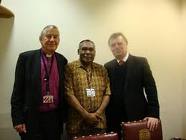These questions are not easy to answer as they involve a long struggle and journey. In the terminology of the Indonesian Institute of Sciences (LIPI), it is the Papua road map. The book published by LIPI, titled Papua Road Map: Negotiating the Past, Improving the Present and Securing the Future, contains findings of the root problems actually faced and questioned by the Papuan people so far.
This book has discovered and formulated four basic issues in Papua: (1) the history and political status of Papua; (2) state violence and human rights violations (3) marginalization of indigenous people; (4) discriminative development. This formulation offers room and opportunity to the Papuans and the central government to sit together for negotiation, mediation, communication and dialogue to propose options for a solution with elegance, dignity and equality.
However, in my view, the four problems found by the team of LIPI actually stem from a single root cause only: the history of Papuan integration into Indonesian territory through Pepera 1969, which was carried out in West Papua on the basis of the Indonesian system of consultation. This Indonesian method differed from the New York Agreement of Aug. 15, 1962 signed by the UN, the US, Holland and Indonesia that Pepera 1969 was to be realized through the international mechanism of one man one vote.
In the process of Papuan integration into Indonesia, the Indonesian military played a major and important role before, during and after Pepera 1969. An official telegram from Col. Soepomo, then the Tjenderawasih XVII Regional Military commander, dated Feb. 20, 1967, based on a radiogram of the Army Commander dated Feb. 7, 1967, said in anticipation of the 1969 referendum in West Irian (Papua): “Intensify all activities in relevant fields intensified by utilizing all material and personnel strengths of the Army as well as the other forces. Strictly follow the guideline provided. The 1969 referendum in West Irian must be won, must be won. Strategic and vital materials must be safeguarded. Minimize the loss of our troops by reducing static posts. This letter is an order to be executed. Make coordination in the best possible way.”
Christofelt L. Korua, a retired police officer and eyewitness, said “the Papuans casting their votes in Pepera 1969 were determined by Indonesian officials and while the chosen people were in their rooms they were tightly guarded by Indonesian soldiers and policemen.” (Interview by the writer in Jayapura, Dec. 11, 2002). “On July 14, 1969, Pepera started with 175 consultative council members for Merauke. On the occasion, a large troop of Indonesian soldiers attended…” (Official report of the UN: Annex 1, paragraphs 189-200).
Most members of Pepera 1969 were people coming from Menado, Toraja, Batak, Ambon/Maluku, and Buton. It was proven by the 59 pro-Indonesia statements in the present UN document. The US Ambassador to Indonesia in 1969 said “95 percent of indigenous Papuans wanted to have freedom” and Sudjarwo Tjondronegoro, the Indonesian team leader to the Act of Free Choice, acknowledged “many Papuans might not wish to stay with Indonesia”.
Dr. Fernando Ortiz Sanz, the UN representative supervising the Pepera, in his official report at the UN General Assembly in1969 said “The majority of Papuan people indicated their desire to break away from Indonesia and support the idea of founding a Free Papua State.” (UN Doc. Annex I, A/7723, paragraph, 243, p. 47).
What is clear and certain is that the outcome of Pepera has invited strong criticism and protests that continue today. Some noted historians like J.P. Drooglever and Hans Meijer have also discovered in their research that Pepera was steeped in orchestration so that Papuan people’s free choice ended in falsehood while a group of voters under considerable duress apparently voted to absolutely support Indonesia.
US Congressman Eni F.H. Faleomavaega was among the initiators of an international movement demanding a review of Pepera in Papua. Along with fellow Congressman Donald Payne, Faleomavaega sent a letter to UN Secretary General Ban Ki-Moon in February 2008, requesting a repeat referendum in Papua. Pressures and demands for an assessment of the political status of have also come from the parliaments of Britain, the European Union and Ireland.
Considering such root issues in the history of Papuan integration into Indonesia with all the orchestration and falsehood, it is a necessity to seek a settlement with the prospect of fostering peace, dignity and humanity between indigenous Papuans and the Indonesian government.
Therefore, the idea of a Jakarta-Papua dialogue between the Indonesian government and the indigenous people of Papua should be supported by all components of society. The dialogue of peace in this context should mean an unconditional talk mediated by a neutral third party like the Jakarta-Aceh dialogue that ended decades of rebellion in the western-most province in 2005.
The unconditional talk here should imply a dialogue without speaking of a free Papua and a unitary state of the Republic of Indonesia. It means an honest dialogue on an equal footing that should apply a new framework toward straightening out the history of Papuan integration into Indonesia.
Without the new framework, this paradox will never find a comprehensive and dignified way of resolution. For this reason, the talk should deal with the Papuan problems with pure conscience and clear minds in order to arrive at a settlement that creates lasting peace for the future of Indonesia and indigenous Papuans. The dialogue is an initial step to negotiate the past, improve the present and secure the future of Papuan people.
The writer is chairman of
the Papuan Baptist Church Alliance.
http://www.thejakartapost.com/news/2011/03/18/why-papua%E2%80%99s-integration-history-needs-straightening.html



 Dr Boediono ... help for indigenous people. Photo: Mosista Pambudi
Dr Boediono ... help for indigenous people. Photo: Mosista Pambudi